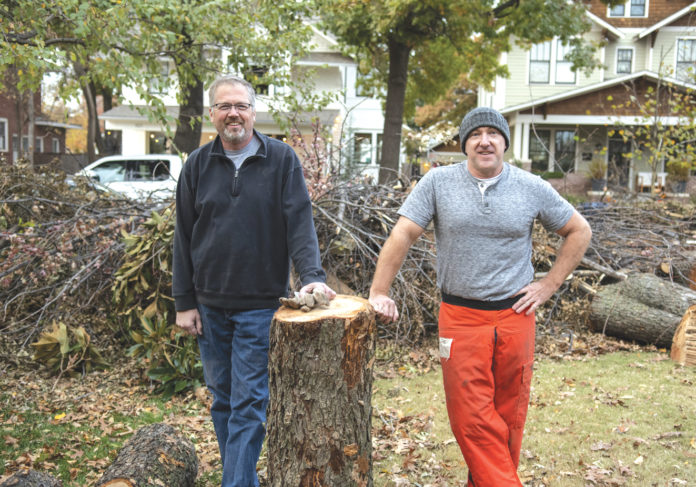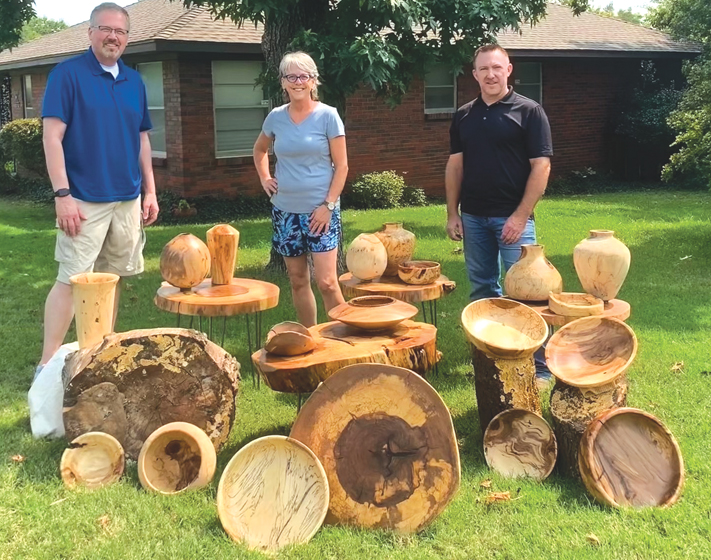



When Mary Schneeberger’s 100-year-old pecan tree snapped during October’s ice storm, part of her heart broke right along with it.
“It lost a major portion of its trunk and its future is in jeopardy,” said Schneeberger, who lives in Oklahoma City’s Mesta Park neighborhood. “It’s just a beautiful tree that adds so much to the house and the property. I was devastated.”
But her boyfriend, Adam Cohen, offered up a silver lining thanks to coworkers at the Oklahoma Medical Research Foundation. Cohen, OMRF’s senior vice president and general counsel, knew that foundation scientists Patrick Gaffney, M.D., and Michael McDaniel had decades of experience as woodworkers.
“I called Pat and Mike and they hurried over to look at the tree,” said Cohen. “They each told Mary they thought they’d be able to make her keepsakes from the wood.”
Gaffney said he thought he could fashion some tables, while McDaniel would aim for a selection of salad bowls and vases. “We’re very excited, because we’ve seen their work, and they’re both incredibly talented craftsmen,” said Cohen.
But Schneeberger’s silver lining will take time. Like science, woodworking has its roots in patience. (story continues below)

WRITE YOUR STORY with Oklahoma’s healthcare leader.
Learn more about our limited time sign-on bonus program!
Work that matters, today and every day. Join the OU Medicine team.
Our intermediate and critical care nurses work with a variety of patients and gain foundational experience while working in a fast-pace environment.
With a new building dotting the Oklahoma City horizon, our state-of-the-art medical tower at OU Medical Center will meet an increasing demand for the highest level of care.
Together, we are answering the call of our community like never before. Now’s the time to write your story with OU Medicine.
ELIGIBLE FULL-TIME POSITIONS:
Medicine Specialty RN | Post-Trauma RN | Neurology RN | Respiratory Therapist
https://oumedicine.wd5.myworkdayjobs.com/en-US/OUMedicineCareers/job/Oklahoma-City/RN—Registered-Nurse—Medicine-Specialty_R0005014
https://oumedicine.wd5.myworkdayjobs.com/OUMedicineCareers/job/Oklahoma-City/RN—Registered-Nurse—Post-Trauma—Days_R0005389-1
https://oumedicine.wd5.myworkdayjobs.com/en-US/OUMedicineCareers/job/Oklahoma-City/RN—Registered-Nurse—Neurology—FT–Nights_R0005100
https://oumedicine.wd5.myworkdayjobs.com/en-US/OUMedicineCareers/job/Oklahoma-City/Respiratory-Therapist-RRT—OU-Medical-Center—Nights_R0004682
Continuous full-time employment within Medicine Specialty RN, Post-Trauma RN, Neurology RN and Respiratory
Therapist positions for each payout period below will result in the full bonus payout. The bonus is offered for Medicine
Specialty RN, Post-Trauma RN, Neurology RN and Respiratory Therapists dedicated to our adult patient population.
The bonus pays out in 6 payments:
2-5 years of applicable experience:
*at time of hire:
$5,000 upon hire
$1,500 after 6 months
$1,500 after 12 months
$1,500 after 18 months
$1,500 after 24 months
$4,000 after 30 months
Earn up to $15,000 total!
6 or more years of applicable experience:
*at time of hire:
$7,500 upon hire
$2,500 after 6 months
$1,500 after 12 months
$1,500 after 18 months
$1,500 after 24 months
$5,500 after 30 months
Earn up to $20,000 total!
For more information, please email: [email protected]
careers.oumedicine.com
OU Medicine, Inc. is an equal opportunity employer.
Gaffney and McDaniel recently wrapped two years of work on nearly 30 original tables, bowls and vases from an ailing sweetgum tree. The diseased tree belonged to Gaffney’s senior lab manager, Kiely Grundahl.
“Sweetgum is a challenging, unpredictable wood to work with,” said McDaniel, whose work from the tree is on display at The Art Hall in Oklahoma City through Nov. 30. “But once I saw it had a fungus, all kinds of possibilities and options started racing through my head.”
Under the right conditions, fungal growth in wood results in a sought-after feature called “spalting.” The natural decaying process develops unique coloration, dark lines and patterns in lumber. Art, meet science.
Divided between the artisans, the wood from Grundahl’s tree was stored for a year to allow spalting to continue and for the lumber to dry. For Gaffney and McDaniel, the wood proved a boon for all the extra time spent around the house in 2020.
Like most of OMRF’s workforce, Gaffney spent the early days of the pandemic working from home. If he got stuck on a research problem, he’d head out to the small woodshop in his garage to do some thinking while sanding slabs or treating the wood from Grundahl’s sweetgum. “I think it even made me more productive with my science. It was the perfect place to think,” he said.
McDaniel also finds respite in the craft. A self-taught woodworker, he fell in love with the hobby when a storm knocked down several Kentucky coffeetrees on his property.
“Every step is rewarding and peaceful in its own way. It’s honestly not too complicated, just time-consuming and requires creativity when things don’t go as planned. Part of the fun is finding the beauty in the chaos,” McDaniel said.
Gaffney and McDaniel’s garages are now full of future projects. Oklahoma City officials estimate the recent ice storm generated 100,000 tons of debris, and the pair got plenty of calls.
OMRF’s Cohen said he knows it may be years before he and Mary see what beauty can be found in the storm’s damage, but it will be well worth the wait.
“If Pat and Mike are able to take a moment of loss and transform it into something beautiful Mary can treasure,” he said, “that will make her immensely happy.”












